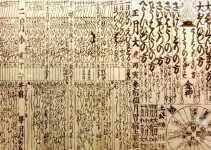Golden Week, a series of holidays between April 29 and May 5, is the biggest time of year for “free travel” in Japan. Whereas other chains of holidays in Japan, such as Obon or the New Year’s holiday, imply an obligation to return to the homestead, like Thanksgiving in the US, Golden Week is an opportunity to go wherever you want, so it’s the time when you’ll find more Japanese hitting the “hot tourist spot of the year” or traveling overseas.
As with other mass travel holidays, it’s best to avoid traveling or visiting touristy spots during this time, but if you’re working in Japan or a short-term international student, you may not have the luxury of choice. My advice includes flexing travel dates and getting off the beaten path.
Golden Week Dates and Travel Dates
Japanese workers typically have a hard time taking time off of work, particularly long stretches in a row, thanks universally terrible leadership and management in Japanese workplaces and the culture of silent, passive-aggressive pressure that results. Partially in recognition of this reluctance (but not the underlying causes), Japan has more public holidays than most other countries so that workers don’t feel bad taking those days off. Golden Week is part of that system and the biggest travel time of the year.
The official holidays of Golden Week are:
- April 29: Showa Day
- May 3: Constitution Day
- May 4: Greenery Day
- May 5: Boy’s Day
Because the four public holidays cover a span of seven days, there is also necessarily going to be a weekend in there somewhere. In most years, therefore, it is possible to take 1-2 days of paid leave to stretch the holiday into a full week off. In 2015, for example, April 29 is a Wednesday, so taking leave on April 30-May 1 would give you a streak of 8 days off (May 3 falls on a Sunday, so the day off is observed on Wednesday, May 6), which is good enough for an overseas trip. Even if you don’t take paid leave, there’s still a 5-day streak (May 2 – May 6), which would be good enough for a domestic trip.
Peak Travel Days
If you’re planning to travel over Golden Week, it’s important to plan well in advance and try to take paid leave strategically so that you’re not travelling on the same day as the rest of Japan, if at all possible. This year, there should be a small bump in travelers on April 29, then the major outbound rush on May 2 and returning rush on May 6. Plane tickets are going to be hard to come by on those days and reserved shinkansen seats? Forget about it. If you can shift your travel by just one day, it will make things a lot easier. If not, try to leave the night before- hit the road or rails on the evening of Friday, May 1, for example.
If you’re coming from the US or other Western countries, you might be familiar with the pre-holiday travel rush beginning on the night before the holiday starts as people take a half a day off of work, or hit the road immediately at closing time. With Japan’s overtime culture, that’s really not so much of a thing, so you won’t see the same level of crowds on the night before. This means that if you’re a student with no evening classes, you can get a jump on travel. Same goes for foreigners working in Japan who have built up an immunity to the overtime pressure.
Crowd Avoidance: Go Rural
OK, that was a misleading title. The only way to avoid crowds on Golden Week is to stay in your own home or apartment, but that’s no fun.
Golden Week is an ideal time to head to the rare, small locations. Go “Beyond the roads’ end” to my favorite region of Japan: Tohoku (Michi noku). Most foreigners in Japan (heck, most people in Japan) live around the large cities like Tokyo and Kyoto, so if that’s you, prefectures like Akita, Aomori, Fukushima, Iwate, Sendai, and Yamagata offer a completely different perspective on Japan, with natural surroundings, a respite from the chaos and noise, and the kind openness of the countryside.
You won’t find many famous shrines or castles in these areas, so if your goal is merely to collect photos of the most famous sites in Japan, rural areas might not do it for you. But if you truly want to experience the serenity of visiting a shrine, temple, or castle, and have time to think about its history and stories, then you will get more out of time spent in a small, deserted rural shrine than you would from an urban one that is ten times larger (and a hundred times more crowded).
The downside to going rural is that public transportation options are minimal, at best. Buses, or local trains that run only once per hour may be your only ways to get around, so don’t plan on a fully-booked schedule. Going rural is the chance to take things slow, to savor one or two experiences rather than catalog 10. I recommend booking a traditional ryokan, bringing a book or ten, and enjoying the quiet reflection time. Visit one or two local sites — the ryokan staff can probably make some good recommendations.
If you’re headed into the city, your best bet for lodging will probably be business hotels, especially those away from the center of town. No matter where you go, Golden Week lodging rates are going to be higher than almost any other time of the year. But if you can’t move your vacation, then it’s a choice between paying extra and not traveling at all. In that case, go! Especially if you’re a city dweller.
No matter where you go- to a country ryokan, into the chaotic maelstrom of the tourist-packed cities, or even overseas to one of Japan’s neighbors, the rule for Golden Week is plan early!





Hi sir, thank you for your efforts . Your posts were really helpful, you gave us perfect advices in mext scholarship application . I’m still waiting for their reply . I want to take the opportunity to thank you here I am very very thankful ^^ . what do you recommend me to do at this time ( learning english/ learning japanese/ preparig maths and physics …) I want to strengthen my opportunities to get the mext :”) . Another question, I didn’t submit the direct placement form and I am applying to undergraduate program that’s mean that i wish to study the japanese language for one year , is that good ?
Going to japan for me is a dream :'( , I wish to achieve it one day
Hi Narcereddine Ziani,
Thank you for your kind words!
If you’re applying for the undergraduate scholarship, then I would certainly recommend studying for the tests in your field. Since you’re not going by direct placement, you’ll have the year to learn Japanese, but getting a head start wouldn’t hurt either.
Good Luck!
– Travis from TranSenz